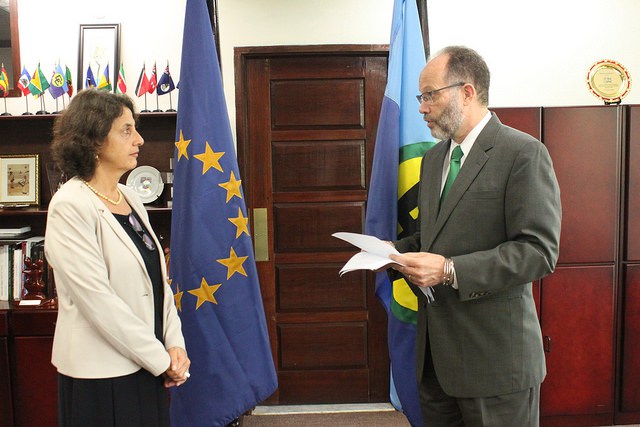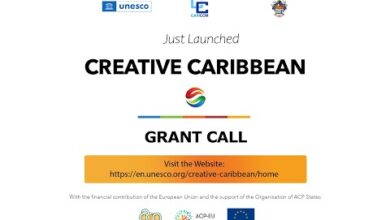|
|
|
The Caribbean Community (CARICOM) on Wednesday 17 March 2017 accredited a new Ambassador of the European Union (EU), with the new envoy advocating for the relationship to more effectively advance a common agenda in global and multilateral fora. In presenting her letters of credence to the CARICOM Secretary-General, Ambassador Irwin LaRocque, Her Excellency Daniela Tramacere pledged that in the face of “populism on both shores of the Atlantic,” the EU will continue to foster political dialogue with the Region. The new EU Ambassador was accredited at a simple ceremony in the office of the Secretary-General at the Headquarters of the CARICOM Secretariat in Georgetown, Guyana. The CARICOM Secretary-General expressed the Community’s profound appreciation to the EU for decades of technical cooperation and assistance to regional development in critical areas. He noted that the various programmes initiated under the European Development Fund framework have been of immense benefit to CARICOM Member States. With the pending expiration of the Cotonou Agreement in 2020 that necessitates renegotiations begin no later than August 2018, she urged a joint process, noting that the EU’s proposals were “rooted in the history of EU-ACP relations.” Describing the EU and CARICOM as two of the most advanced integration processes of the world, Ambassador Tramacere said the EU was pleased to support regional integration tangibly. Focussing attention on the Economic Partnership Agreement (EPA) between the EU and CARIFORUM, with CARIFORUM accounting for a market of over 27 million people, a part of the world almost as big geographically as the EU, she said the success of the EPA depended on “our capacity to explain its functions.” Noting that the potential of the EPA to advance trade relations between CARIFORUM and the EU should not be underestimated, she said the parties must work together to ensure those benefits were communicated effectively. “We must not forget that EPA, taking into account the respective levels of economic and social development, seeks to enhance intra-regional and extra-regional trade and economic relations, to support a new trading dynamic by means of the progressive, asymmetrical liberalisation of trade and investment flows, and to reinforce, broaden and deepen cooperation, with a view to building on and improving the Cotonou level of preferential market access into the EU for the CARIFORUM States,” the newly accredited EU Ambassador stated. Ambassador LaRocque said that given the great emphasis the Cotonou Agreement placed on human rights and the rule of law as guiding principles between ACP States and the EU, CARICOM remained concerned about the Dominican Republic’s Constitutional Court ruling on nationality which rendered many Dominicans of Haitian descent stateless. This situation, he said, remained a stumbling block in improving CARICOM relations with the Dominican Republic, a member of CARIFORUM. The CARICOM Secretary-General agreed that while development cooperation had been a cornerstone of CARICOM-EU relations, the political dimension has been a critical part, highlighting the importance of multilateral cooperation on issues including the sustainable development of Small Island Developing States, climate change and the implementation of the 2030 Development Agenda. Also underscoring the need for enhanced political dialogue between the EU and CARICOM, he called on the multilateral organisation to become more sensitive to the peculiar challenges and vulnerabilities of Small Island and Low-Lying Coast States. “Global arrangements which speak to advancing growth and sustainable development take on a special significance of our countries, indeed, for our very existence as developing countries. However, if small states are to truly benefit from existing global development arrangements, we must be able to have access to the necessary concessionary development funding to bolster our development efforts,” the Secretary-General said, adding that GDP, as a formal measure for determining development status, on its own, does not adequately reflect a country’s level of development, especially among SIDS. He told the new EU envoy that there were international partners who had become sensitive to this reality and urged a similar stance by the EU “as a progressive and substantive position” on the issue of graduation. Emphasising that CARICOM Member States were determined to forge a path to economic diversity, he said that CARICOM remained unwavering in its commitment to protect the integrity of that sector. Against this backdrop, the Secretary-General drew to Ms Tramacere’s attention, the black listing of a number of CARICOM Member States by some EU Member States as “high-risk and non-cooperative jurisdictions” in respect of the conduct of financial services. In light of the European Commission issuing a new list of non-cooperative jurisdictions later this year, Mr. LaRocque emphasised that CARICOM financial services sector had been certified as compliant by all the relevant global regulators. “The countries of the EU should be guided by this established position,” he said, adding that blacklisting of CARICOM Member States triggered other harmful actions such as de-risking, and the withdrawal of correspondent banking services that has the potential to disconnect the small economies of CARICOM from the global economy. After the accreditation Secretary-General LaRocque and the Ambassador engaged in wide ranging discussions including on the post-Cotonou Agreement relations between the African Caribbean Pacific Group of States (ACP) and the European Union (EU). The Secretary-General indicated that the ACP was an excellent platform for the EU to interact with a large group of developing countries. Among other topics were renewable energy and the challenges posed by de-risking and the listing of countries as non-cooperative tax jurisdictions. Caption: (L-R) Ambassador Colin Granderson, Assistant Secretary-General, Foreign and Community Relations, Her Excellency Daniela Tramacere, Ambassador of the European Union to CARICOM, Ambassador Irwin LaRocque, CARICOM Secretary-General and Mr. Percival Marie, Director-General, CARIFORUM. |
European UnionForeign PolicyHaitiHome Page SlideshowPress Releases
EU wants to advance common agenda with CARICOM in global fora







